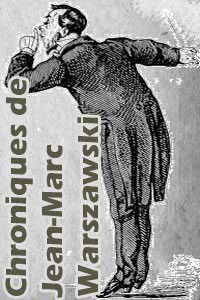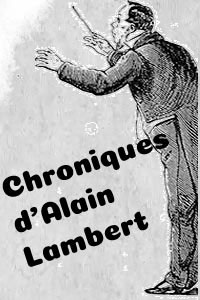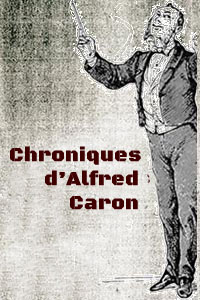jeudi 5 février 2015
Dreams of Germany: Music and (Trans)national Imaginaries in the Modern Era
Call for Papers
5-7 février 2015, Londres
Deadline for Paper Proposals: 30 April 2014 to dreamsofgermany at gmail.com
Venue: German Historical Institute, London, 5-7 February 2015
Keynote Speakers: Celia Applegate (Vanderbilt); Berthold Hoeckner (Chicago).
Convenors: Andreas Gestrich (GHIL) Neil Gregor (Southampton), Tom Irvine (Southampton)
Celia Applegate and Pamela Potter's groundbreaking collection of essays on ‘Music and German National Identity' sought to map both the historical terrain on which the notion of Germans as ‘the people of music' was constituted and an intellectual terrain on which that trope might be fruitfully historicised. In this conference, we seek to revisit these questions and explore the problem space further in the light of approaches that have emerged in the meantime. In working with the rubric of ‘dreams' we seek to acknowledge both the visceral qualities of a set of imaginaries that cannot be reduced to a corresponding set of politics, but work also independently of them, and the presence of a recognizably German set of histories for which the vocabulary of dreams (fantasies, projections, recollections, nightmares) provides an equally recognizable metaphorical language.
We invite papers on all aspects of modern musical culture that would sit meaningfully inside the rubric ‘Dreams of Germany', for example:
How does class function in relation to musical Germanness?
How might Germany as a musical construct be inflected by gender?
To what extent do declarations of musical Germanness exclude or embrace registers other than ‘art or ‘E-Musik'?
How did young Germans (the Jugendmusikbewegung, the generation of the ‘Stunde Null' and the ‘1968ers') dream of their music?
How did emigrants and other outsiders from Edward Dannreuther to Theodor W Adorno to (the Austrian) Falco (‘Rock me Amadeus') imagine German music and musical culture?
How did music function in conceptions/dreams of the German colonial mission, and how did and do ideas of Germany as a musical nation play in non-colonial contexts such as Britain, Japan, Latin America, the United States and Israel/Palestine?
To what extent were cultural politics post-1989 inflected by ideas of a specifically German national music?
For further details or queries please contact Neil Gregor or Tom Irvine, dreamsofgermany at gmail.com
Les compositeurs-critiques au XXe siècle
5 février 2015, Université Paris Ouest Nanterre.
Dans la continuité d'illustres prédécesseurs qui contribuèrent, au cœur du XIXe siècle, à donner à la critique ses lettres de noblesse – Berlioz, Schumann, Liszt, Wagner –, bien des compositeurs approchèrent au XXe siècle l'activité critique, dans le sillage de Debussy ou de Schoenberg. Quelle que soit leur motivation – d'ordre financier, polémique, esthétique ou médiatique –, quelle que soit la nature, l'abondance ou le support de publication de leurs textes, ces derniers jouirent et jouissent encore d'une incontestable autorité. Cette autorité fut même un argument mis en avant par les journaux, le cas échéant, pour s'attirer un lectorat aussi nombreux que distingué.
Seulement voilà : au procès de compétence, qui fut souvent attenté aux critiques musicaux (au point d'être devenu un stéréotype du discours métacritique depuis le XIXe siècle), se substitua, en l'occurrence, un procès en légitimité. De violents débats surgirent, à l'instar de celui qui opposa Boris de Schloezer et Charles Koechlin dans la Revue musicale en 1927. Dans son Traité de la critique musicale, Armand Machabey enfonça le clou deux décennies plus tard : « Le compositeur de vocation, écrit-il, doit rester compositeur : il ne peut être, en raison même de sa personnalité, bon critique». Même Debussy n'est point épargné.
Inscrits dans un débat polémique très caractéristique de son temps, ces propos interrogent la position particulière du compositeur, juge et partie, lorsque ce dernier s'empare de la fonction critique. Mais si les fondements du procès en légitimité peuvent être largement discutés, d'autres questions, qui lui sont intimement liées, se posent toujours : les compositeurs sont-ils les meilleurs critiques musicaux, en raison de leur compétence technique et de leur connaissance interne du métier ? Quelle est la nature du discours qu'ils livrent en tant que critiques ? Ont-ils une plume nécessairement moins affûtée que les « littérateurs » ? Leurs textes impliquent-ils un type de lecture spécifique, des méthodes d'approche particulières ?
Cette journée co-organisée par Timothée Picard (Rennes II) et Emmanuel Reibel (Paris Ouest Nanterre) s'inscrit dans le cadre d'un programme concernant « La critique musicale au 15e siècle » (Institut universitaire de France). On trouvera un descriptif des journées passées ou à venir sur le site du CELLAM (www.cellam.fr).
Programme
Jeudi 5 février 2015 (9h-18h), Université Paris Ouest Nanterre
Bâtiment B - Rez-de-chaussée - Salle Paul Ricoeur B016
9h Accueil des participants
9h30 Michel Duchesneau
Conférence liminaire. Les compositeurs-critiques, scientifiques ou artistes ?
Présidence Michel Duchesneau
10h Pauline Ritaine
La critique de Dukas, appui ou obstacle à la composition ?
11h15 Vincent Giroud
Reynaldo Hahn, critique éclectique ?
11h45 Cécile Quesney
Marcel Delannoy et Arthur Honegger : deux compositeurs-critiques sous l'Occupation
APRES-MIDI
Présidence Vincent Giroud
14h15 Annelies Fryberger
La blogosphère et les réseaux sociaux, nouveaux outils du compositeur-critique contemporain.
14h45 Nicolas Donin
« De moi à moi » ? Dialogues réels et imaginaires dans le discours public des compositeurs
Présidence Nicolas Donin
15h30 Sarah Barbedette
"L'incantation qui fera germer l'oeuvre". Aspects de la critique selon Pierre Boulez
16h François Balanche
« Se soustraire du pouvoir », « ne soumettre personne » : la liberté comme valeur dans la critique musicale d'André Boucourechliev
16h30 Table-ronde animée par Timothée Picard et Emmanuel Reibel
Avec Gérard Condé et Claude Samuel
Responsable :
Timothée Picard et Emmanuel Reibel
url de référence https://www.cellam.fr/
adresse
Université Paris Ouest Nanterre RER A - Nanterre Université Bâtiment B - Rez-de-chaussée - Salle Paul Ricoeur B016
Gotthold Schwarz assure la direction du Thomanerchor de Leipzig
Le chef Gotthold Schwarz reprend provisoirement la direction du Thomanerchor (Le Chœur Saint-Thomas) jusqu'en mars 2016.
Georg Christoph Billers qui dirige le célèbre ensemble depuis 22 ans, a interrompu milieu janvier ses activités pour des raisons de santé.
Les engagements et concerts en tournée du cœur sont maintenus.
La ville de Leipzig pourvoira au remplacement définitif de Billers en mars 2016.
Gotthold Schwarz est né en 1952 à Zwickau (Saxe), il a été musicalement formé Dresde et Leipzig. Il a déjà remplacé Billers à plusieurs reprises.
L'église Saint-Thomas de Leipzig est célèbre dans le monde pour avoir été celle où Johann Sebastian Bach a développé l'essentiel de sa carrière. Le cantor est inhumé dans le chœur.
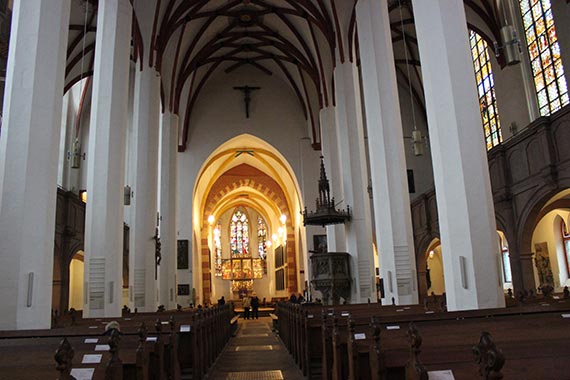
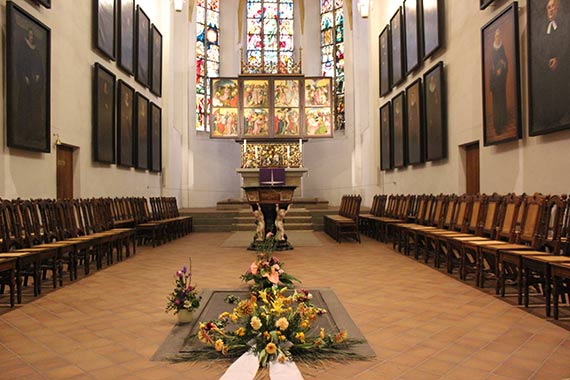 L'intérieur de la Thomaskirche (église Saint-Thomas)
de Leipzig et la tombe de Johann-Sebastian Bach. Photographies Jean-Marc Warszawski, mars 2014.
L'intérieur de la Thomaskirche (église Saint-Thomas)
de Leipzig et la tombe de Johann-Sebastian Bach. Photographies Jean-Marc Warszawski, mars 2014.
Keep it Simple, Make it Fast! Crossing Borders of Underground Music Scenes
15-17 juillet 2015, Porto
CFP Deadline: 28 Feb 2015
The Faculty of Arts and Humanities of University of Porto, Portugal, are pleased to announce the second KISMIF International Conference.
This initiative follows the great success of the first KISMIF conference (held in July, 2014). Keeping the focus on underground music and its creative possibilities for resistance and DIY, we extend the analysis of music scenes to consider the intersection and debate with other cultural, artistic and creative fields (cinema and video; graffiti and street art; theater and performance art; literature and poetry; radio; graphic design, illustration, cartoon and comics; etc.).
The conference organizing committee welcomes abstracts relating to the following topics:
• Developments in social theory around networks, flows, art worlds, musical fields, artistic fields, underground music scenes
• Historicity, genealogy and diachrony of music scenes and art worlds from the post-war period to the present day
• Researching music: methodological challenges and dilemmas
• Subcultures, tribes, neo-tribes and underground scenes
• Contradictions and tensions between the underground and mainstream
• DIY Careers: alternative forms of musical, artistic and cultural entrepreneurship
• Style, aesthetic and musical corporeality
• Music scenes, art worlds: aging and gender
• Memory, technologies and the cultural and creative industries
• New intermediate and artistic production in the city and space
• Territorial mechanisms on music production, intermediation and consumption
• New dynamics of social inclusion through music and underground art practices
• Music and arts for social change, the arts and arts communities as part of urban culture
• Pedagogies and methodologies based on the underground
• Practices of resistance, and contemporary countercultural youth identities
• New social movements, music and other artistic scenes (local and global) etc.
Revue de presse musicale
(Euronews) Andrea Bocelli: «J‘épouse chaque projet avec la même passion»
(20 minutes) Des places à 10 euros pour les jeunes à l'Opéra de Paris
(L'Express) Stéphane Lissner: «L'opéra tire tout le monde vers le haut»
(RTBF) Pour un cerveau plus performant, rien de tel que la musique
(Culturebox) Dans les entrailles de l'auditorium de Lyon qui fête ses 40 ans
(Télérama) A quoi reconnaît-on un spectateur de concert classique ?
(France 3 Alsace) La Clemenza di Tito
(France 3 Franche-Comté) Guillaume Connesson, compositeur en résidence du Festival de musique de Besançon, remporte une Victoire de la Musique
(Le Point) Opéra de Paris : 2015-2016, la première vraie saison, selon Lissner
musicologie.org |
Biographies de musiciens |
Articles et documents |
© musicologie.org 2014
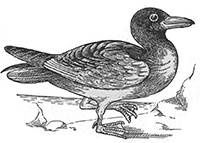
Dimanche 15 Février, 2015 21:13
| L | M | M | J | V | S | D |
|---|---|---|---|---|---|---|
| 01 | ||||||
| 02 | 03 | 04 | 05 | 06 | 07 | 08 |
| 09 | 10 | 11 | 12 | 13 | 14 | 15 |
| 16 | 17 | 18 | 19 | 20 | 21 | 22 |
| 23 | 24 | 25 | 26 | 27 | 28 |
Articles et documents
Bibliothèque
Nouveaux livres
Colloques & conférences
Universités en France
Petites annonces
Téléchargements




